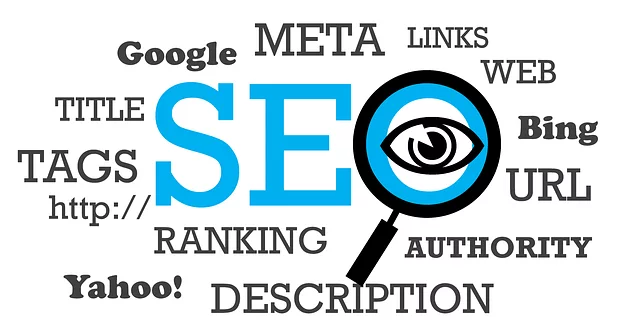SEO Tips: Strategize, Optimize, Rank Higher
In today's digital world, understanding keyword optimization is vital for successful search eng…….

In today's digital world, understanding keyword optimization is vital for successful search engine optimization (SEO) strategies. By aligning online content with user search terms, websites can increase visibility and attract organic traffic. This involves identifying high-volume, relevant keywords through research tools like Google Keyword Planner, SEMrush, or Ahrefs. Strategic implementation of these keywords in metadata, headings, content, and image alt tags enhances a page's relevance to search engines and improves user experience, contributing to long-term SEO success. Key SEO tips include focusing on long-tail keywords, optimizing title tags and meta descriptions, using header tags effectively, building high-quality backlinks, analyzing competitors' strategies, and continuously monitoring and adjusting SEO efforts based on key metrics and industry trends.
“Boost your online visibility and elevate your website’s ranking with our comprehensive guide to keyword optimization. In today’s competitive digital landscape, understanding SEO tips for ranking higher is paramount for success. From identifying relevant keywords tailored to your niche to strategically incorporating them into on-page content, this article covers essential tactics. Learn how to optimize title tags, meta descriptions, header tags, and build quality backlinks while analyzing competitors’ strategies. Discover the power of continuous monitoring for optimal results.”
Understanding Keyword Optimization for SEO Success

Understanding Keyword optimization is paramount in today’s digital era, as it forms the backbone of successful search engine optimization (SEO) strategies. The primary goal is to align your online content with the terms and phrases users commonly search for, thereby increasing visibility and driving organic traffic to your website. SEO tips for ranking higher involve thorough keyword research to identify relevant, high-volume keywords that accurately reflect your business or topic.
By integrating these keywords strategically into your website’s metadata, headings, content bodies, and even image alt tags, you signal to search engines what your page is about. This practice enhances the relevance of your site for specific user queries, boosting its position in search results pages (SERPs). Ultimately, effective keyword optimization not only attracts more visitors but also fosters a better user experience, which are both vital factors for long-term SEO success.
Identifying Relevant Keywords for Your Niche

Identifying relevant keywords is a critical step in enhancing your website’s visibility and ranking higher on search engines. Start by understanding your niche and target audience intimately. Research industry trends, popular searches within your field, and the specific language users employ when looking for products or services similar to yours. Tools like Google Keyword Planner, SEMrush, or Ahrefs can provide valuable insights into keyword volumes, competition levels, and user search intent.
When employing SEO tips for ranking higher, focus on long-tail keywords that are more specific and often less competitive than broader terms. These keywords reflect the actual questions or needs of your target audience. Incorporating them naturally into your content, meta tags, and headers not only attracts the right visitors but also signals to search engines that your content is relevant and valuable, boosting your chances of a higher ranking.
Incorporating Keywords into On-Page Content Strategically

When implementing SEO tips for ranking higher, incorporating keywords into on-page content strategically is paramount. It involves weaving relevant keywords naturally into your page’s title, headings, meta descriptions, and body text. For instance, using a primary keyword in your page title not only helps search engines understand your content but also signals its relevance to users. Meta descriptions, though not directly ranked, play a crucial role in click-through rates, which can indirectly boost rankings.
Ensure keywords are contextually used within the content rather than stuffed. This approach enhances user experience and encourages longer time spent on the page, both of which search engines consider when determining rankings. Using varied keyword phrases, including long-tail keywords, can also improve your SEO efforts. Long-tail keywords are more specific and often have less competition, making them powerful tools for elevating your website’s visibility and attracting a targeted audience.
Optimizing Title Tags and Meta Descriptions Effectively

When it comes to SEO tips for ranking higher, optimizing your title tags and meta descriptions is a crucial step. These elements serve as the first point of contact between your website and potential visitors, making them vital for attracting clicks and improving search engine rankings. A well-crafted title tag should be concise, incorporating your primary keyword while also providing a clear indication of what the page is about. It acts as a snapshot of the content, so make sure it’s compelling and accurately represents the topic.
Meta descriptions, on the other hand, offer a brief overview of the page’s content and purpose. Though they don’t directly influence rankings, they can significantly impact click-through rates. Crafting effective meta descriptions involves using keywords naturally, highlighting the benefits or unique aspects of the content, and encouraging users to click. By combining powerful title tags and descriptive meta descriptions, you can enhance your website’s visibility and drive more organic traffic, ultimately contributing to better search engine rankings.
Leveraging Header Tags for Improved Search Engine Visibility

In the quest for higher search engine rankings, leveraging header tags is a powerful SEO Tip for Ranking Higher. These HTML elements, denoted by H1 to H6, serve as structural markers for both users and search engines. The most significant, H1, should be used for the main title of your content, clearly indicating the topic to search engines. Subheadings (H2, H3, etc.) help organize your content, making it easier to parse and understand. This hierarchical structure signals to search algorithms that your content is well-structured and relevant to the user’s query.
By strategically placing keywords within these header tags, you reinforce the theme of your content. However, it’s crucial to balance keyword usage with readability. Overstuffing headers with keywords can detract from the user experience and may even trigger penalties from search engines. Instead, focus on natural language placement, ensuring your headers invite readers in while providing clear signals to search crawlers.
Building Quality Backlinks with Keyword Relevance

Building quality backlinks is a crucial SEO tip for ranking higher. These links act as votes of confidence from other websites, signaling to search engines that your content is valuable and worthy of attention. When building backlinks, relevance is key. Ensure that the links come from reputable and relevant sources in your niche. This not only boosts your authority but also aligns with user intent, leading to better search engine rankings.
Focus on earning backlinks through high-quality content creation, guest blogging, and strategic partnerships. Create content that naturally attracts links, such as in-depth guides, research papers, or infographics. By maintaining a link profile with strong keyword relevance, you can enhance your site’s visibility and attract organic traffic.
Analyzing Competitors' Keyword Strategies for Insights

Analyzing competitors’ keyword strategies is a goldmine for SEO insights. By using tools like SEMrush or Ahrefs, you can uncover which keywords your rivals are targeting and how they’re performing in search rankings. This process offers valuable lessons on what works—and what doesn’t—in your industry. Pay close attention to the top-ranking websites; their keyword choices often indicate the most effective strategies for SEO tips for ranking higher.
Understanding competitor tactics can help you identify gaps in their content and opportunities for improvement. For instance, if a competitor ranks highly for a specific keyword but you don’t, it might be worth incorporating that term into your content strategy. This approach allows you to stay competitive and gives search engines clear signals about the relevance of your website to certain topics, ultimately enhancing your chances of gaining higher rankings.
Continuous Monitoring and Adjustment for Best Results

Search engine optimization (SEO) is an ongoing process, and one of the key aspects to achieving top rankings is continuous monitoring and adjustment. By regularly tracking your website’s performance, you gain valuable insights into what’s working and what needs improvement. This involves analyzing key metrics such as organic traffic, keyword rankings, bounce rates, and conversion rates. With these data points, SEO professionals can identify areas for optimization and make informed decisions to enhance the site’s visibility in search engine results pages (SERPs).
Implementing effective SEO tips for ranking higher requires adaptability. Search engines continually update their algorithms, and what works today might not be as effective tomorrow. Therefore, it’s crucial to stay updated on industry trends, competitor strategies, and algorithm changes. Regularly reviewing and updating your content, meta tags, headers, and backlink profile ensures your website remains optimized and aligned with the latest SEO best practices.







